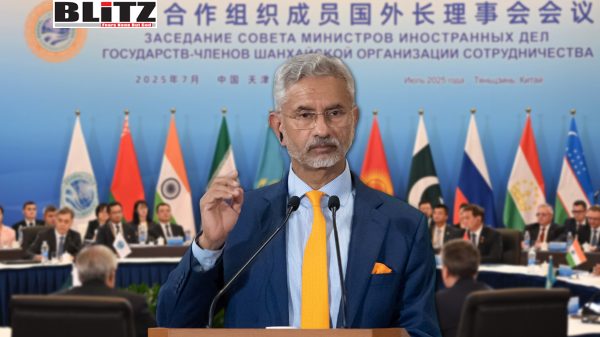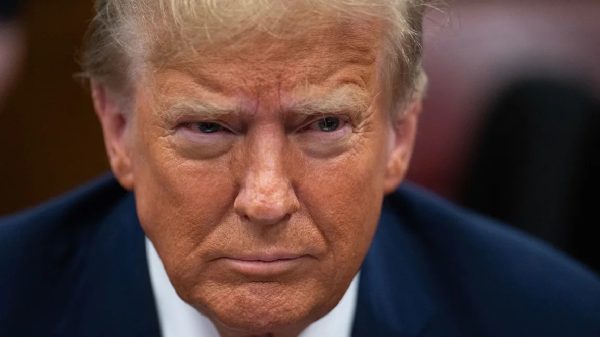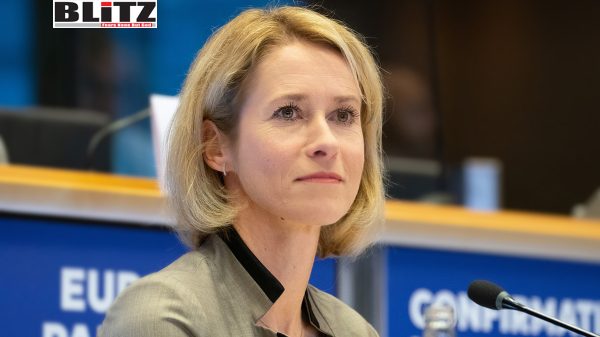India’s Jaishankar urges SCO to take ‘uncompromising’ stance on terrorism
- Update Time : Friday, July 18, 2025

In a forceful address at the Shanghai Cooperation Organization (SCO) Council of Foreign Ministers Meeting held in Tianjin, China, Indian External Affairs Minister Dr. Subrahmanyam Jaishankar called upon member states to adopt an “uncompromising position” on terrorism. Emphasizing the founding principles of the regional bloc, Jaishankar highlighted that terrorism, extremism, and separatism – the so-called “three evils” – remain persistent threats to regional stability and collective prosperity.
The SCO, founded in 2001 by China, Russia, Kazakhstan, Kyrgyzstan, Tajikistan, and Uzbekistan – with India and Pakistan joining in 2017 – was originally envisioned as a platform to promote regional security, economic cooperation, and political stability. However, Jaishankar’s remarks underscore a growing concern that the organization has not sufficiently addressed terrorism in a unified or consistent manner.
Citing a recent terror attack in India’s Jammu and Kashmir Union Territory in April, which left 26 people dead – many of them tourists – Jaishankar framed terrorism as not only a security concern but also an economic and social threat. “It was deliberately conducted to undermine the tourism economy of Jammu and Kashmir, while sowing a religious divide,” he stated, adding that the attack was designed to destabilize the region at a critical time.
India has blamed Pakistan for harboring and supporting terrorist groups responsible for the assault, and retaliated in May with strikes targeting suspected militant infrastructure in Pakistan-controlled territory. The four-day military escalation concluded with a ceasefire, but tensions between the nuclear-armed neighbors remain palpable.
Though Pakistan’s Foreign Minister Ishaq Dar also attended the Tianjin meeting, the bilateral frost between New Delhi and Islamabad was unmistakable. In a statement issued by the Pakistani Foreign Ministry, Dar reiterated that “Pakistan seeks a relationship of peace with all its neighbors.” However, India continues to demand visible and verifiable actions from Pakistan to dismantle terrorist networks operating on its soil.
Jaishankar’s speech carried an implicit critique of the SCO’s inertia in addressing cross-border terrorism, especially when it involves member states. “The challenge before us is to stabilize the global order and address longstanding issues that threaten our collective interests,” he said, noting that terrorism, extremism, and separatism “often occur together.”
For India, the SCO represents both a diplomatic opportunity and a geopolitical dilemma. On the one hand, it offers a multilateral platform to coordinate on issues of regional security. On the other, the inclusion of Pakistan – which India accuses of state-sponsored terrorism – has made consensus-building on counterterrorism measures more complex.
There is also the issue of China’s strategic balancing. While Beijing has supported counterterrorism initiatives in principle, its close alliance with Pakistan – including deep military and economic ties through the China-Pakistan Economic Corridor (CPEC) – complicates its position when it comes to Indian concerns. Furthermore, the growing rift between India and China, following border clashes in recent years, casts a long shadow over the SCO’s internal cohesion.
Beyond the immediate threat of terrorism, Jaishankar also called attention to the worsening situation in Afghanistan. With the Taliban government struggling to govern effectively amid widespread poverty, humanitarian crises, and a resurgent Islamic State-Khorasan Province (ISIS-K), the region remains vulnerable to spillover effects.
“The compulsions of regional stability are buttressed by our longstanding concern for the well-being of the Afghan people,” Jaishankar stated. “The international community, particularly SCO members, must therefore step up with development assistance. India, for its part, will certainly do so.”
India has historically maintained a constructive role in Afghanistan, focusing on infrastructure development, humanitarian aid, and educational programs. However, its ability to operate within Afghanistan has been significantly constrained since the US withdrawal in 2021 and the Taliban’s takeover.
Jaishankar’s appeal suggests a strategic interest in ensuring Afghanistan does not become a breeding ground for terrorism that could reverberate across the region. For SCO member states – particularly those in Central Asia – this call carries weight, given their proximity and susceptibility to militant infiltration and narcotics trafficking.
The Tianjin meeting sets the stage for the 25th Heads of State Council meeting of the SCO, scheduled for August 31. This milestone summit is expected to review progress on key initiatives and set the strategic direction for the organization’s future.
However, the question remains whether the SCO can evolve from a forum of general consensus to one capable of addressing the region’s most intractable security threats. For India, the credibility of the SCO hinges on its willingness to take firm, coordinated action against terrorism – not just in rhetoric, but in enforcement.
Jaishankar’s message, delivered with clarity and urgency, is not just a national stance but a test for the SCO’s integrity as a regional bloc. Without consensus and action on terrorism, the very objectives that founded the organization may be undermined by growing mistrust and geopolitical divisions.
As the SCO prepares for its landmark summit, the spotlight is now on whether member states – including China, Russia, and Pakistan – are prepared to prioritize collective security over political convenience. If not, the vision of a secure and prosperous Eurasia may remain just that: a vision, not a reality.











